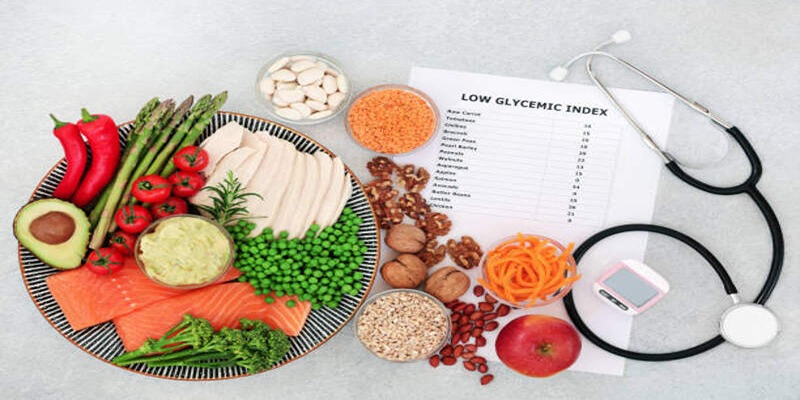In Leaky Gut Syndrome, the bowel lining becomes more porous, enabling toxins, germs, and undigested food particles to enter the circulation. This syndrome's prevalence has increased research on diet's impact on gut health. Since this issue is still being studied, food changes are typically suggested to relieve symptoms and repair the stomach.
Understanding diet's impact on Leaky Gut Syndrome is vital. A healthy stomach is crucial to overall health, from immunity to mental wellness. Changes in diet may reduce inflammation, aid healing, and avoid gut lining damage. Thus, treating Leaky Gut Syndrome requires a customized diet. Embracing a variety of healthful nourishment that may help to restore and sustain gut health is equally vital as eliminating specific foods. This page discusses gut-healthy foods, foods to avoid, and a hypothetical diet plan for Leaky Gut Syndrome.

Foods to Eat for a Healthy Gut:
Foods high in probiotics help maintain intestinal health. Yogurt, kefir, kimchi, and sauerkraut include gut-enhancing microorganisms that assist digestion. A healthy gut microbiota is vital for gut health; therefore, include them in your diet. Fiber-rich fruits, veggies, and whole grains are crucial for intestinal health. They stimulate regular bowel motions, healthy bacteria development, and waste and toxin clearance. Oats and flaxseeds, high in soluble fiber, decrease inflammation and heal the stomach.
Fatty seafood like salmon, flaxseeds, and chia seeds contain omega-3 fatty acids, which reduce inflammation. Healthy fats reduce gut lining inflammation and are essential for gut health. Bone broth, aloe vera, and herbs may repair the intestinal lining. Collagen and amino acids in bone broth repair the gut, while anti-inflammatory aloe vera aids the digestive system.
Foods to Avoid for a Healthy Gut:
Refined sweets and processed meals harm the intestines. These products typically include chemicals, preservatives, and high sugar levels, distorting gut flora balance, causing inflammation and Leaky Gut Syndrome. Gut health requires avoiding processed meals and eating whole, unprocessed foods.
Leaky Gut Syndrome sufferers should avoid gluten and wheat in bread, pasta, and baked goods. Gluten may cause intestinal inflammation. Some may benefit from removing gluten and wheat to improve intestinal health.
Leaky Gut Syndrome sufferers may have trouble eating dairy, which is high in calcium and protein. Dairy intolerance and digestion issues might cause digestive issues. If you have gastrointestinal difficulties, try fermented dairy or dairy substitutes.
Fats, particularly saturated fats, may cause inflammation and gastrointestinal issues. These lipids may influence gut flora and permeability, worsening Leaky Gut Syndrome symptoms. Limiting high-fat, fried, and processed meals is essential for intestinal health.
The Role of Diet in Managing Leaky Gut:
Diet is critical to controlling Leaky Gut Syndrome. Diet affects gut health and intestinal lining. Gut-healthy diets include nutritious, gut-friendly meals and avoiding those that may worsen gut disorders. This technique reduces inflammation, heals, and supports intestinal function.
A diet that supports good gut flora is commonly suggested for Leaky Gut Syndrome patients. Yogurt, kefir, kimchi, and sauerkraut include living cultures that support healthy gut microbiota. A fiber-rich diet, including fruits, vegetables, and whole grains, promotes regular bowel motions and a healthy gut.
The same goes for avoiding specific foods for Leaky Gut Syndrome. Foods with refined sugars and artificial additives may upset gut flora and cause inflammation of the lining. Due to gastrointestinal discomfort, gluten and wheat are also banned in grains and processed meals. Leaky Gut Syndrome symptoms may be alleviated by avoiding dairy products, which may cause gastrointestinal pain.
Diet affects intestinal health. By excluding certain food types, Leaky Gut Syndrome symptoms may be reduced, and the gut lining healed. Management and gut health sometimes depend on personalized diet modification.
Sample Leaky Gut Diet Plan:
Eat probiotic-rich yogurt with berries and chia seeds for a gut-friendly breakfast. A healthy breakfast is an easy-to-digest smoothie with spinach, fruit, and milk made from almonds, including a teaspoon little almond spread.
Lunch and Dinner: Grilled chicken or tofu with colorful veggies and quinoa are lean protein options. Ginger and turmeric-seasoned stir-fries with bell peppers, broccoli, and carrots are delicious.
Options: Eat sliced veggies with hummus or a handful of mixed nuts or seeds for healthy fats. Gut-friendly, nutrient-dense snacks.
Hydration: Hydrate all day. Teas like chamomile or peppermint may assist digestion and give a calming alternative to coffee.

Promoting Gut Health through Nutrition:
Healthy guts need probiotic-rich foods. Yogurt, kefir, kimchi, and sauerkraut contain healthy bacteria. Eat them to balance the gut microbiota, vital to gut health. Live cultures in these meals improve digestion and promote gut bacteria development. Keep your gut healthy with a high-fiber diet. Fiber-rich fruits, vegetables, and whole grains promote regular bowel movements and help eliminate waste and pollutants. Soluble fiber from oats and flaxseeds reduces inflammation and heals the gut.
Flaxseeds, chia seeds, and salmon contain omega-3 fatty acids known to reduce inflammation. Reduced gut lining inflammation helps mend and maintain gut health with these healthy fats. Foods for Gut Healing: Specific foods are gut-healing. Bone broth includes collagen and amino acids that mend the intestinal lining. An anti-inflammatory gut-healing agent, aloe vera promotes the digestive system and gut health.
Lifestyle Adjustments for Gut Health:
Manage Stress: Stress may worsen digestive troubles. Meditation, yoga, mindfulness, and deep breathing help reduce stress and improve intestinal health. Regular Exercise Improves Digestion and Reduces Inflammation: A balanced workout plan that fits your lifestyle and health may improve your Gut health. Digestion and body equilibrium depend on daily hydration. Water helps maintain gut health and manage Leaky Gut Syndrome symptoms.
Conclusion:
While still debated in medicine, Leaky Gut Syndrome strongly argues for nutrition and lifestyle's impact on gut health. Knowing the gut's function in general health and the possible effects of a damaged intestinal lining emphasizes the need for a customized diet and lifestyle to address this illness.
Gut health and nutrition are linked. Including probiotic-rich meals, high-fiber alternatives, omega-3 fatty acids, and gut-healing ingredients while limiting processed foods, refined sugars, gluten, dairy, and high-fat products promotes gut health. Modifications minimize inflammation, improve healing, and restore intestinal health.
Lifestyle modifications, including stress management, exercise, and hydration, can control Leaky Gut Syndrome beyond food. These factors improve intestinal health and well-being. Although food and lifestyle affect gut health, leaky Gut Syndrome is still being studied. Tailored dietary and lifestyle changes may help Leaky Gut Syndrome sufferers improve their gut health.




